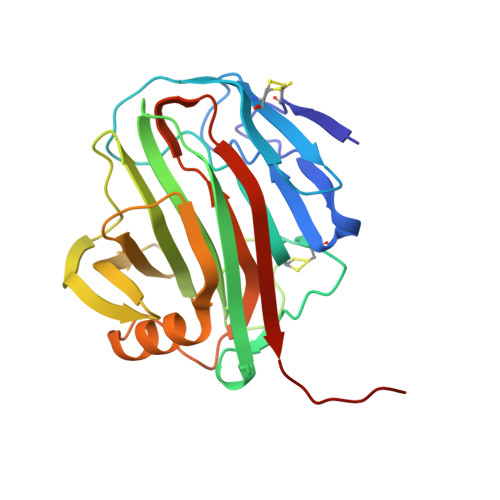Characterization of the Biomass Degrading Enzyme GuxA from Acidothermus cellulolyticus.
Hengge, N.N., Mallinson, S.J.B., Pason, P., Lunin, V.V., Alahuhta, M., Chung, D., Himmel, M.E., Westpheling, J., Bomble, Y.J.(2022) Int J Mol Sci 23
- PubMed: 35682749
- DOI: https://doi.org/10.3390/ijms23116070
- Primary Citation of Related Structures:
7MKR, 7MKS - PubMed Abstract:
Microbial conversion of biomass relies on a complex combination of enzyme systems promoting synergy to overcome biomass recalcitrance. Some thermophilic bacteria have been shown to exhibit particularly high levels of cellulolytic activity, making them of particular interest for biomass conversion. These bacteria use varying combinations of CAZymes that vary in complexity from a single catalytic domain to large multi-modular and multi-functional architectures to deconstruct biomass. Since the discovery of CelA from Caldicellulosiruptor bescii which was identified as one of the most active cellulase so far identified, the search for efficient multi-modular and multi-functional CAZymes has intensified. One of these candidates, GuxA (previously Acel_0615), was recently shown to exhibit synergy with other CAZymes in C. bescii, leading to a dramatic increase in growth on biomass when expressed in this host. GuxA is a multi-modular and multi-functional enzyme from Acidothermus cellulolyticus whose catalytic domains include a xylanase/endoglucanase GH12 and an exoglucanase GH6, representing a unique combination of these two glycoside hydrolase families in a single CAZyme. These attributes make GuxA of particular interest as a potential candidate for thermophilic industrial enzyme preparations. Here, we present a more complete characterization of GuxA to understand the mechanism of its activity and substrate specificity. In addition, we demonstrate that GuxA exhibits high levels of synergism with E1, a companion endoglucanase from A. cellulolyticus. We also present a crystal structure of one of the GuxA domains and dissect the structural features that might contribute to its thermotolerance.
Organizational Affiliation:
Biosciences Center, National Renewable Energy Laboratory, 15013 Denver West Parkway, Golden, CO 80401, USA.




















